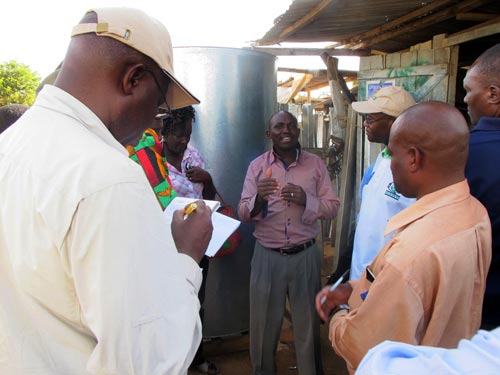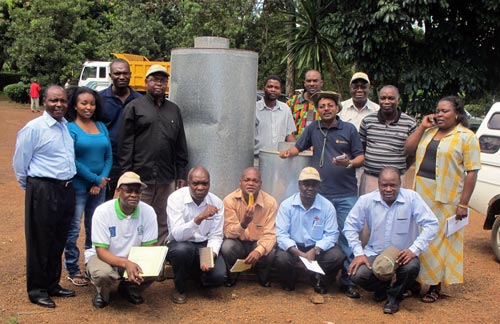 A delegation from Kenya, Malawi, Zimbabwe, and Zambia — the target countries of the Effective Grain Storage for Sustainable Livelihoods of African Farmers (EGSP) Phase-II Project— visited Malawi during 22-23 October and Kenya during 25-26 October 2012 to share experiences with project implementation and to learn about the project’s impact on the livelihoods of smallholder farmers. The delegation comprised of officials from ministries of agriculture and national agricultural research systems from the four EGSP countries, and implementing partners (Kenya Agricultural Research Institute and the Catholic Dioceses of Embu and Homa Bay in Kenya, World Vision in Malawi, Zambia Agricultural Research Institute, and University of Zimbabwe and the Department of Agricultural Mechanization in Zimbabwe).
A delegation from Kenya, Malawi, Zimbabwe, and Zambia — the target countries of the Effective Grain Storage for Sustainable Livelihoods of African Farmers (EGSP) Phase-II Project— visited Malawi during 22-23 October and Kenya during 25-26 October 2012 to share experiences with project implementation and to learn about the project’s impact on the livelihoods of smallholder farmers. The delegation comprised of officials from ministries of agriculture and national agricultural research systems from the four EGSP countries, and implementing partners (Kenya Agricultural Research Institute and the Catholic Dioceses of Embu and Homa Bay in Kenya, World Vision in Malawi, Zambia Agricultural Research Institute, and University of Zimbabwe and the Department of Agricultural Mechanization in Zimbabwe).
The tour kicked off in Malawi with visits to Mchinji and Dowa districts. The delegates held discussions with the implementing partners and local artisans trained on metal silo fabrication, school representatives, farmer groups, and farmers who had benefitted from the first phase of the project. Everyone present praised the metal silo for its great results in protecting the grains against the larger grain borers and weevils. “This allows farmers to store maize more effectively and sell it when prices are as high as 47 kwacha [US$ 0.16] per kilogram and not when prices are at 18 kwacha [US$ 0.06] per kilogram,” says Andrew Kasalika, chairman of the Tayamba Group in Mlonyeni Extension Planning Area. “With metal silos, women do not have to climb into granaries, which is quite cumbersome,” added Christine Victory, Tayamba Group’s secretary, noting that the technology is also environmentally friendly, “Men do not have to cut trees to construct the granaries.”
In Kenya, the delegation visited Kamuthatha Boarding Primary School in Embu County, which has acquired six 2,700-kilogram metal silos. Nethy Kathungu, the deputy principal, shared the enormous benefits of metal silos: increased quality of grain and thus increased quality of food for the pupils; reduced postharvest losses (previously amounting to 60% of stored grain); price hikes no longer affecting the school during times of scarcity, as they can now store enough to feed all 450 pupils; no need for pesticides; and less storage space required to store the same amount of grain. As a result, the school saves about Ksh 300,000 (US$ 3,600) per year.
The delegates also visited Gikinyukia Agro-Enterprise Self-Help Group in Mbeere South District, Embu County. The Group participates in collective maize, sorghum, and green grams marketing, and owns three 1,800-kilogram metal silos. According to Gibson Wachira Muchiri, the Group chairman, the plan is to assist every member in acquiring a metal silo through the Group’s fund.
The delegates found the visit very educative and informative, especially officials from Zimbabwe and Zambia who will be implementing the project for the first time. The visit allowed them to witness the implementation of EGSP in Kenya and Malawi as well as the role of different partners in the process. The visits also helped the delegates to identify issues that need to be addressed for the second phase to be successful. These include cost-sharing for sustainability of the project, creating a sense of ownership, and producing a sufficient amount of maize for the metal silos to be fully utilized.
Speaking to the delegates, B.M. Prasanna, CIMMYT’s Global Maize Program director, reiterated the importance of the project in enhancing nutrition and food security of smallholder farmers and consumers. He called on the delegates to be the champions of the project and asked them to take it to the next level: “We can only be a catalyst, but we would like you to be the drivers of this movement. You should stimulate demand for the technology. CIMMYT derives its strength from people like you.” Noting that awareness was critical to the success of the project, Prasanna also encouraged the officials to raise awareness among the target beneficiaries, women, women self-help groups, schools, and women-dominated organizations in particular.

 Gender equality, youth and social inclusion
Gender equality, youth and social inclusion